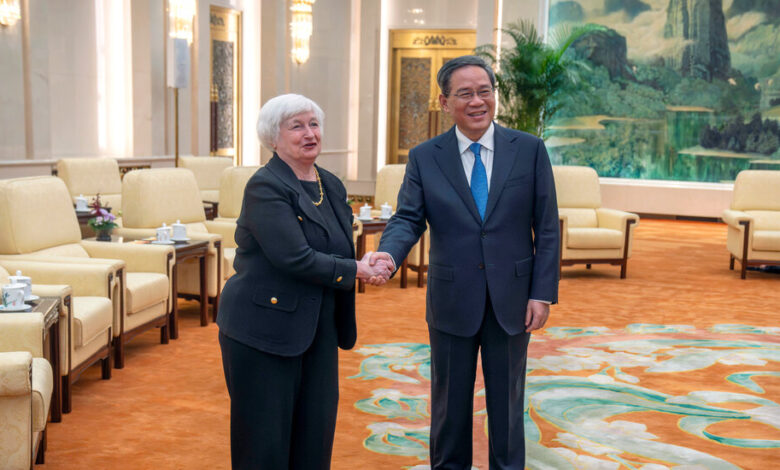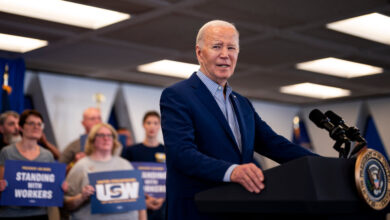Yellen Sees ‘More Work to Do’ as China Talks End With No Breakthrough

Four days of top-level economic meetings between the United States and China concluded in Beijing on Monday with no major breakthroughs, but the world’s two largest economies agreed to hold more discussions to address rising friction over trade, investment and national security.
The conversation is poised to become even more difficult, however, as hopes of greater economic cooperation collide with a harsh political reality: It is an election year in the United States, and antipathy toward China is running high. At the same time, Chinese officials appeared unmoved by Treasury Secretary Janet L. Yellen’s urging that China scale back its recent surge of green energy technology exports, which could threaten American jobs.
Despite a warm welcome on her second trip to China as Treasury secretary, which included meetings with the premier and with senior economic and finance officials, it was evident that the level of trust between the two sides does not run deep.
“There is much more work to do,” Ms. Yellen said at a news conference in Beijing on Monday. “And it remains unclear what this relationship will endure in the months and years ahead.”
Ms. Yellen also met on Monday with Pan Gongsheng, the governor of the People’s Bank of China. She had earlier held talks in the southern city of Guangzhou with her primary counterpart, Vice Premier He Lifeng. The two sides agreed to hold more discussions, including on fostering “balanced growth,” a reference to the flood of exports from China that some officials argue is distorting global markets.
Several sensitive issues will test the new lines of communication that the United States and China have been working to cultivate.
The most pressing matter that is likely to divide them in the coming months is how the Biden administration plans to address concerns that Chinese exports of electric vehicles, lithium-ion batteries and solar panels pose a threat to the very industries that the United States is spending trillions of dollars to develop domestically.
During her meetings with her Chinese counterparts, Ms. Yellen tried to argue that China should focus more on investing in domestic consumption and warned that flooding markets with exports would disrupt supply chains. Europe, Mexico and Brazil are all pursuing anti-dumping investigations into China that could lead to new trade restrictions, and Ms. Yellen suggested that the United States was prepared to protect its burgeoning industries.
China has denied illegally subsidizing its new energy exports, and it has raised concerns about what its officials perceive as a wave of unfair protectionism. During a meeting on Sunday between Ms. Yellen and Premier Li Qiang in Beijing, Mr. Li pushed back on the question of Chinese exports. He said the issue should be viewed objectively and from “a market perspective,” pointing to China’s position that the surge in exports is driven by global demand.
“China hopes that the U.S. side will work with the Chinese side to adhere to the basic norms of market economy of fair competition and open cooperation, and refrain from politicizing and national-securitizing economic and trade issues,” Mr. Li was quoted as saying in an official summary of the meeting issued by the Chinese government. (Economists and foreign trade officials, however, argue that China’s industrial policy — including low-interest loans from state banks to factories and low-cost land transfers — helps the country’s exports.)
The prospect of additional American tariffs comes as China has been seeking a rollback of some of the ones that Washington imposed on Chinese imports during the Trump administration.
Treasury officials said that they did not make any tariff threats during their meetings in China, but they did note that several other countries had been initiating anti-dumping investigations in response to the flood of cheap Chinese green energy exports.
“There is little prospect of a significant de-escalation of tariffs and other trade restrictions imposed by Washington, but avoiding any further escalation of overt bilateral trade hostilities in the coming months would in itself be an accomplishment for both sides,” said Eswar Prasad, a former head of the International Monetary Fund’s China division.
A senior Treasury official who spoke to reporters on the condition of anonymity, as is customary for such government briefings, said Chinese officials had voiced concerns about U.S. national security measures directed at China. The Biden administration has been focused on preventing China from gaining access to information about American consumers; restricting China’s access to technology, such as semiconductors, that could advance its military; and preventing electric vehicles with Chinese components from being eligible for U.S. subsidies through the Inflation Reduction Act of 2022.
In Washington, Congress is working through legislation that aims to force the Chinese company ByteDance, under threat of an American ban, to sell the social media platform TikTok. Chinese officials raised that issue with Ms. Yellen during the talks, the Treasury official said. The Biden administration views TikTok as a national security concern, and President Biden has indicated that he will sign the TikTok legislation bill if it passes.
On Monday, Ms. Yellen described the national security conversations with China as “difficult” and indicated that the United States would work to clearly signal its plans and intentions.
“While the U.S. needs to continually evaluate its national security measures given the rapid pace of technological development, we are committed to ‘no surprises,’” Ms. Yellen said.
The Biden administration faces calls from both Democratic and Republican lawmakers at the national and local levels for measures that aim to decouple the two economies, through investment restrictions and new tariffs on Chinese imports. At the same time, Beijing has sought reassurances from Washington that it does not seek to decouple from China.
Ms. Yellen emphasized on Monday that while the United States wants to protect national security, it does not seek to sever trade and investment between the two countries.
“Our two economies are deeply integrated, and a wholesale separation would be disastrous for both of our economies,” she said.
Siyi Zhao contributed reporting from Seoul.



